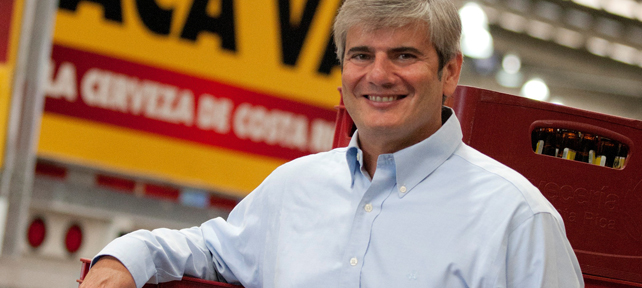Florida Ice & Farm Co. is one of the few companies around the world that has been able to implement a Triple Bottom Line Strategy. While many companies have sustainability strategies, the truth is that few of them have managed to merge their business strategy with their sustainability strategy. CEO, Ramón Mendiola, has systems in place to measure three types of profitability every month: financial, social and environmental. The company is a Costa Rican holding company with four areas of businesses: beverages & food, real estate & hotels, retail and investments.
The main focus of the business is beverages & food and the company operates from its headquarters in Costa Rica, exporting to 12 countries in Central America and to the U.S. With 10 manufacturing facilities, 17 distribution centers and more than 5,200 employees, sustainability has become an integral part of Florida Ice & Farm Co.’s strategy. In October 2008 Mendiola decided to merge their business strategy with their corporate social responsibility strategy to become a Triple Bottom Line company.
At the end of each month, instead of measuring only one profit indicator (financial), they measure three: financial, social and environmental. During their meticulous planning process, they define strategic priorities for each dimension. For environmental they decided to become water neutral by 2012, reduce electricity consumption, reduce carbon emissions to become carbon neutral by 2017 and become a zero solid waste company by 2011.
They have achieved two of these strategic objectives according to their deadlines and have only their carbon neutral goal left. To help measure their progress in attaining the social, environmental and financial goals the company has set, they use a Sustainability Balanced Scorecard that measures both individual and group achievements.
The results of this scorecard are used to calculate the remuneration of the company’s managers and top executives. Their total performance is measured in three categories, each with its own ratio: 60 percent economic, 30 percent social and 20 percent environmental. Mendiola believes that the main driver behind his organization´s sustainability business practices is really simple, “We believe this is the right way of doing business and one that will create a competitive advantage for our company in the long term.”
He also likes to quote Swiss businessman Stephan Schmidheiny: “It’s impossible to build successful companies in failed societies.” Mendiola’s company has implemented environmental and sustainability initiatives that have become benchmarks in Latin America and around the world.
Their triple bottom line strategy and the way they compensate employees – according to environmental, social and economic indicators – has ensured that the goals they want to achieve are taken seriously by management. It must be working, their techniques have been studied by the World Economic Forum, INCAE, and Harvard’s INSEAD project.
https://notablemagazine.com/uber-launches-the-worlds-first-rideshare-submarine/




































